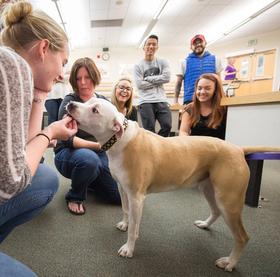Healthcare Careers: In-demand Careers
Community colleges have become a popular place to jumpstart a new career, whether you are entering the professional workforce for the first time or looking to change career paths. One of the hottest degree trends at these two-year schools right now is health care, with plenty of choices in areas of study and ample job opportunities after graduation. You might work directly with patients or find an administrative position in the healthcare industry – and it all begins with training at your local community college.
Why Community College for Health Care?
Many interested in the healthcare field make the mistake of thinking a four-year degree is necessary to land a well-paying job in the industry. However, several graduates who come into their jobs with two-year associate degrees can make excellent salaries with minimal training time. Some of the top jobs in health care requiring an associate degree can earn an average salary of $50,000 or more, and opportunities for advancement and salary increases are always possible. When you offset this salary change with education costs that are a fraction of what they would be at a four-year school, you can see why many are choosing the community college route to launch their healthcare careers.
This video describes the healthcare program at Sampson Community College in Clinton, North Carolina.
Another advantage of choosing a community college for your healthcare degree is that many programs are available. From administrative roles to jobs working directly with patients and other medical professionals, you can find a program that meets your needs and preferences at a two-year institution. Here are some of the healthcare fields you can get into with a two-year degree:
- Dental Hygienist
- Respiratory Therapist
- Occupational Therapy Assistant
- Physical Therapy Assistant
- Diagnostic Medical Sonographer
- Radiologic Technician
- Licensed Practical Nurse (LPN)
- Pharmacy Technician
- Medical Billing and Coding Specialist
- Health Information Management Specialist
With so many possibilities, the community college in your area will likely offer a healthcare program that you can use to launch a successful and rewarding career in the industry.
Community colleges are often unique from their four-year counterparts in the job placement services they provide to students. These institutions often partner with companies in the area to ensure the training they provide is exactly what employers are looking for. These companies hire students right after graduation, knowing they bring the necessary skills right from the start. Community colleges also frequently host career fairs and other events to help connect students with employers.
What's Involved
Dental Hygienist: Cleans teeth, examines patients for oral diseases and provides preventive dental care. They educate patients on proper oral hygiene and work closely with dentists to ensure overall oral health.
Respiratory Therapist: Cares for patients with breathing difficulties. They assess lung function, administer treatments, and manage ventilators for patients with chronic respiratory diseases or in critical care situations.
Occupational Therapy Assistant: Works under occupational therapists to help patients develop, recover, and improve skills needed for daily living and working. They assist with therapeutic activities and teach patients how to use special equipment.
Physical Therapy Assistant: Helps physical therapists implement treatment plans for patients recovering from injuries or illnesses. They assist with exercises, massage, and other therapeutic interventions to improve mobility and reduce pain.
Diagnostic Medical Sonographer: Uses specialized equipment to create images of the body's organs and tissues. They operate ultrasound machines to produce sonograms or ultrasounds for diagnostic purposes.
Radiologic Technician: Performs diagnostic imaging examinations like X-rays and CT scans. They prepare patients for procedures, operate imaging equipment, and work with radiologists to evaluate images.
Licensed Practical Nurse (LPN): Provides basic nursing care under the direction of registered nurses and doctors. They monitor patients' health, change dressings, and administer basic care in various healthcare settings.
Pharmacy Technician: Assists pharmacists in dispensing prescription medication. They prepare and package prescriptions, maintain inventory, and interact with customers in retail or hospital pharmacies.
Medical Billing and Coding Specialist: Manages healthcare data in medical records. They assign codes for diagnoses and procedures, process insurance claims, and ensure accurate billing for healthcare services.
Health Information Management Specialist: Organizes and manages health information data. They ensure its quality, accuracy, accessibility, and security in both paper and electronic systems while complying with regulations.
This video offers some reasons for becoming a dental hygenist.
Community colleges certainly play an important role in training up the next generation of health care professionals. If this career path sounds like the best choice for you, check out 10 of the hottest degree programs available at community colleges today.
Associate vs. Bachelor Degree Programs
Last year, the American Association of Community Colleges (AACC) released a policy brief that compares associate and bachelor degree programs in nursing. The brief used 2008 federal data from an Institute of Medicine Report, which had recommended an increase of nurses with bachelor’s degrees to 80 percent of the workforce. However, the data revealed something somewhat different, as reported by the Community College Times.
“The purpose of the brief was to use data to examine the validity of moving 80 percent of the nation’s nursing workforce to the baccalaureate-degree level,” Roxanne Fulcher, director of health professions policy at AACC and co-author of the brief, told Community College Times. “However, the data demonstrated measure-by-measure that ADN (associate degree in nursing) programs surpassed BSN (bachelor of science degree in nursing) programs in meeting the nation’s workforce and reformed health-system challenges.”
The report stated that nearly half of all licensed RNs were initially educated in ADN programs, which has increased since 2005 to more than half. ADN programs also educate more than 50 percent of all minority nurses. The cost of a community college education is much less than that of a four-year institution, making this training – at least at the beginning of one’s career – an excellent value for the money.
Students of ADN programs who went on to earn their bachelor's degrees also showed significant benefits to the local healthcare industry, particularly in rural communities. The report states, “ADN-prepared RNs are a sound economic and social investment to communities, including those in rural America where unique factors create disparities in health care not found in urban America.”
The Bottomline
The field of health care is a popular and consistently evolving one, as new technology continues to change the face of the industry. One thing that remains constant in the health care industry, however, is the need for qualified professionals who can come into entry-level positions and provide patients with high-quality care and health care professionals with top-notch support. An associate degree in health care may be the first step to a rewarding and lucrative career that can take students well into the future.
Questions? Contact us on Facebook or Instagram. @communitycollegereview
#HealthcareCareers #TwoYearDegree #MedicalJobs #AlliedHealth #CommunityCollege #HealthTech #MedicalField #CareerOpportunities #HealthcareEducation #MedicalProfessionals















